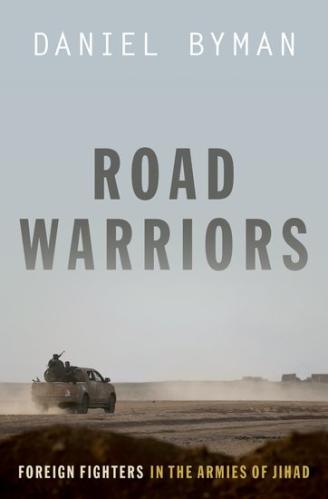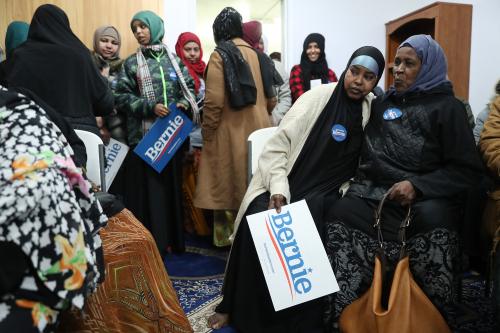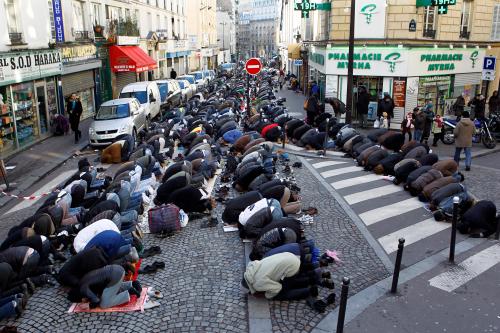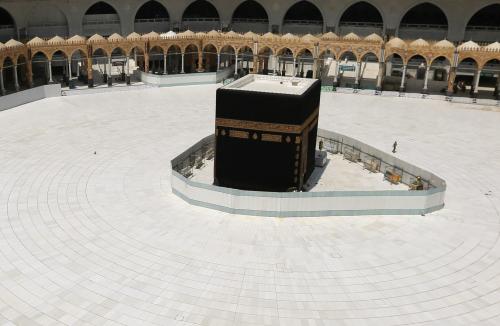Content from the Brookings Doha Center is now archived. In September 2021, after 14 years of impactful partnership, Brookings and the Brookings Doha Center announced that they were ending their affiliation. The Brookings Doha Center is now the Middle East Council on Global Affairs, a separate public policy institution based in Qatar.
The novel coronavirus that causes the disease known as COVID-19 is sweeping across the Middle East and reigniting religious tensions, as governments tighten the reins on long-held practices in the name of fighting the pandemic.
There is no doubt that the restrictions, including the closure of Shia shrines in Iraq and Iran and the cancelation of the hajj to Mecca in Saudi Arabia, are necessary for public health reasons. Ordinarily, these sites draw millions of Muslim pilgrims. Shia Muslims kiss the walls of the shrines, where religious figures are buried. Such long-held gatherings are breeding grounds for disease in ordinary times and certainly would cause COVID-19 to spread further, perhaps unlike anything seen to date.
But these religious restrictions could have damaging consequences. Government prudence aside, in countries such as Morocco, Saudi Arabia, Bahrain, and Iraq many view the restrictions as violations of religious practice and, in some cases, outright repression of religious minorities.
The question many Muslims are asking in the region is: Will religious expression, as they knew it, ever return once the COVID-19 era has passed? Or could the new normal be used as yet another justification to marginalize religious expression deemed too extreme, or religious practices that are politically inconvenient?
The Kingdom of Saudi Arabia, for example, has sealed off the Eastern Qatif Province — home to a minority Shia population of about 500,000 — and quarantined people there. This was the only province in the country that was completely cut off. Shia in Qatif are perpetually at odds with Saudi Arabia’s Sunni-dominated government. Saudi officials say it was necessary to suspend entry and exit from the province to stop all travel to and from neighboring countries. Shia pilgrims travel to Iran, for example, for pilgrimage to the holy shrines in Qom and Mashhad, even though it is illegal.
Saudi officials have pointed fingers at Iran, the epicenter of the virus in the Middle East, for spreading the disease throughout the region. Iran is Saudi Arabia’s key regional rival, and the restrictions raise questions about whether there are other motivations at play, and whether Qatif will be re-opened when COVID-19 infection rates subside. Suspending entry and exit from Qatif deprives the Shia of visiting holy shrines in Najaf and Karbala in Iraq, which shares a border with Saudi Arabia. Millions of Shia pilgrims visit the shrines, considered the holiest, in the two cities each year.
The Saudis could maintain the lockdown indefinitely and in so doing make it difficult for the Shia to deepen bonds between neighboring Shia communities. In recent years, transnational networks and affiliations have developed among Shia communities across borders, and they are now at risk.
Similarly, in Bahrain, the Sunni-dominated government is delaying the return of more than 1,000 Shia pilgrims from Iran in light of COVID-19. They had visited the holy city of Mashhad, home to the shrine of the eighth Shia Imam, Ali Ibn Musa-al Ridha. Although this is a logical health precaution, rather than leave them outside Bahrain’s borders with no plan in sight, the authorities could have allowed them to enter but require the pilgrims to be quarantined, as has been the approach in many countries worldwide.
Bahrain’s government has discriminated against its majority Shia population for decades, and that behavior intensified after the Shia-led uprising against the government in 2011. Bahrain’s government is also a staunch enemy of Iran, and often claims that Shia pilgrims visiting Iran are actually involved in trying to undermine the Bahraini government with backing from Tehran.
Morocco took aggressive policy measures early on to battle the spread of the coronavirus, suspending flights and closing various public venues, including restaurants, cafes, sports clubs, hammams, and movie theaters, on March 16. The same day, the Supreme Council of Ulema issued a fatwa to temporarily close mosques. This fatwa was issued in response to a request from King Mohammed VI, in his capacity as the “Commander of the Faithful.” On March 20, the country announced a “state of health emergency” and unleashed security forces to implement the bans against public gatherings.
There was pushback against closing the mosques. Salafist preacher Abu Naim published a video on social media condemning the policy measure. He was quickly arrested for “inciting hatred” and “undermining public order.” Other Salafists, including, Hassan el-Kettani, cited a fatwa from a Kuwaiti cleric, Hakem al-Mutairi, who condemned the closures of mosques and the suspension of daily prayers across the region. According to Arabic news reports, dozens of people across the cities of Tangier, Fes, Sale, and Tetuan gathered outside to pray and protest the closure of the mosques on March 21 and 22.
Several people were arrested for violating the state of health emergency. While most Moroccans have respected the ban on public gatherings, including religious ones, many have expressed concern about the impact of these measures on religious rites, such as burials. The health ministry has issued a “special protocol” for the burial of those who died of COVID-19 as well as new directives for burials in general since mosques have closed. This means that prayers are not performed in mosques, but rather at burial sites. A limited number of people are allowed to attend.
These restrictions are not taking place in a vacuum.
For now, these restrictions surrounding the banning of public gatherings — including religious services — are in line with policies implemented across the globe, as advised by the World Health Organization, to curb the spread of COVID-19. However, these restrictions are not taking place in a vacuum and could be used in the future to clamp down on dissent and religious freedom. Moroccan authorities have targeted Salafists, and Islamists more generally, in the past, especially after a major terrorist attack in 2003 in Casablanca. The regime has particularly targeted the Islamist opposition group Al-Adl wal-Ihssan (Justice and Benevolence). However, this group expressed its solidarity with the government measures and encouraged people to stay home, in a rare display of unity.
In Iraq, controversy has arisen over burying the victims of COVID-19. Some Iraqis did not want to bury the dead because they feared the disease could spread from corpses to the general population. Some protesters blocked authorities from burying the victims. Grand Ayatollah Ali al-Sistani, who is considered the most authoritative religious figure in Iraq, intervened with a fatwa and declared that the dead must be wrapped in three shrouds and be buried, as required in Islam. Cremation is forbidden in Islam.
The Middle East has a long history of government-imposed religious restrictions and favoritism. According to studies conducted by the Pew Research Center, which has tracked religious restrictions for years, the Middle East ranked highest in the world for religious restrictions each year from 2007 to 2017. Pew found that 19 of 20 countries in the region (aside from Lebanon) favor a religion, 17 have a state religion, and two have a preferred religion.
The coronavirus may subside eventually around the world, but its imprint on both politics and religious practice in the Middle East may be felt for years to come with no remedy in sight.
The Brookings Institution is committed to quality, independence, and impact.
We are supported by a diverse array of funders. In line with our values and policies, each Brookings publication represents the sole views of its author(s).









Commentary
Are COVID-19 restrictions inflaming religious tensions?
April 13, 2020